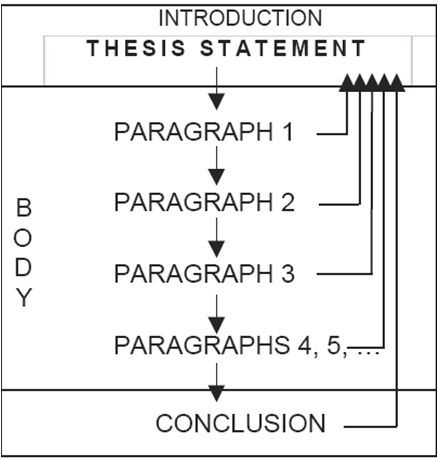Many papers you write require developing a thesis statement. Here you will learn what a thesis statement is and how to write one.
Read below for lots more help:
What Is A Thesis Statement?
The thesis is a key sentence in your paper; it tells your reader about the paper’s focus. Because thesis statements should be short and focused, they should usually only be one sentence long.
The thesis almost always comes as the final sentence of the first paragraph (the introduction).
The thesis idea usually appears again in the first sentence of the conclusion (although in different words). This reminds the reader of your point and allows the reader to evaluate how well you have developed and supported your point-of-view.
Two Types Of Thesis Statements
There are two general types of thesis statements:
- the “Point-of-View” thesis, which presents an argument or case to be made.
- the “Scope” thesis, which simply outlines the scope of the paper.
The “Point-of-view” Thesis
This type of thesis makes one main point which can also be described as the key insight you are explaining, the central argument you are putting forward, the case you are arguing, or the claim you are making. The purpose of your entire paper is to provide evidence and explanation that back up the thesis.
A “point-of-view” thesis should be:
Suitable:
- Make sure your topic and thesis stem directly from the assignment instructions for the paper.
- Make sure it connects to key concepts you are learning in the course.
Specific/focused/limited:
- The thesis needs to focus your paper on a specific piece, aspect, or side of a general topic.
- Limiting the topic to one specific group of people, to one time period, to one geographical location, to one specific character, to only the problem or to only the solution. Any number of these limiting factors can be combined to make the thesis specific.
Feasible:
- You need to have enough material to fully support the thesis you have chosen. If you are not able to find enough research, or you don’t have enough examples, reasons, expert opinions/quotations, facts, and explanations to fill up the size of the paper that you need to write, then you might have chosen the wrong topic.
- At the same time, if you have too much material for the size of the paper you were assigned, you need to further limit your thesis (see #2 above) so that the paper doesn’t turn into a book.
Insightful:
- Have a point to make that is worth making. Your main point or central idea should not be so obvious that most readers will already know what you are going to discuss or explain in the paper. Instructors do not want to read through points that are already common knowledge.
Significant:
- It needs to be about what the audience (instructor or maybe classmates) will take seriously or care about. If your audience can say “So what?” or “Why does that matter to us?” you might not have a significant case to make.
The “Scope Thesis”
For some assignments, students are not expected to take a point of view. Instead, they are expected to answer a series of questions or give information about a topic. For these types of assignments, the thesis simply states what the paper is about. Sometimes it may even include a short list of sub-topics included in the paper.
For example, “This paper explores the challenges faced by people with bipolar disorder and suggests strategies communities can take to assist them.”
Similar to the point-of-view thesis, the scope thesis should:
- Be short and clear.
- Be suitable to the assignment instructions.
- Identify a scope that is feasible considering the length of paper assigned.
What Makes A Good Thesis Statement?
What Should You Avoid When Writing A Thesis Statement?
- A question:
Instructors do not want you to raise questions in your thesis; they want you to provide answers. Instructors especially do not want to see rhetorical questions (questions that either have no answer or have implied answers and are made only to argue a point, not to provide insightful analysis that leads to answers).
- Statements of fact that need no further support or proof.
- A detailed list of everything that you will try to include in the paper
Tips For Writing A Thesis Statement
Don’t attempt writing your thesis statement until you have explored your topic through research and brainstorming. You can’t take a position until you’ve done your research!
Write a thesis using these four steps:
- Re-state the assignment or topic.
- Take a position on the issue.
- Briefly state your reasons why/how.
- Revise: take out any wordiness or vague ideas, and make sure the thesis relates to the topic.
How Your Thesis Statement Fits Into The Essay
Remember:
Your thesis statement articulates your position.
Your essay supports your thesis.
The paragraphs in the body of your essay must connect with each other as well as with your thesis statement.
Revise and/or refocus as necessary (thesis, body paragraphs or both) if further research causes your position to change, or to maintain coordination between thesis statement and body.

From Characteristics of a Strong and Effective Thesis Statement (UofT)
Thanks to the following two Universities for providing information on thesis statements.

